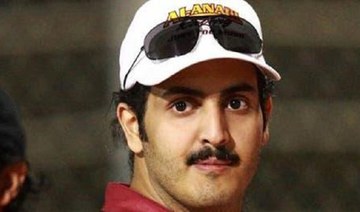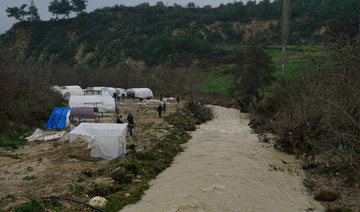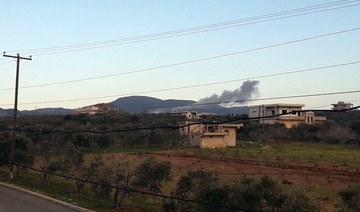CHICAGO: The legal fight to hold Sheikh Khaled bin Hamad Khalifa Al-Thani accountable will not be discouraged by any intimidation, the attorney of a man suing the Qatari royal for more than $33 million told Arab News.
Attorney Rebecca Castaneda’s comments came after the girlfriend of co-plaintiff Matthew Allende was found brutally bludgeoned and raped in her security-gated condominium in Pasadena, California.
Allende, one of two contractors who have accused Al-Thani of trying to kill them because they refused his orders to defend his honor and kill his enemies, said he fears that the brutal assault of his girlfriend is tied to the lawsuit.
Castaneda said she cannot confirm that the rape and assault are linked to the lawsuit she filed against Al-Thani on behalf of Allende and co-plaintiff Matthew Pittard.
But she insisted that the legal fight to hold Al-Thani accountable will not be discouraged by any intimidation.
“We don’t yet know all the facts surrounding what occurred, but the plaintiffs aren’t dissuaded in any way from pursuing their cases. In fact, it has had the opposite effect and they’re now more driven than ever to succeed,” Castaneda told Arab News.
A high-profile playboy race car driver, Al-Thani threatened Allende and Pittard and, according to the lawsuit, vowed that they “would pay the price” for refusing to kill his enemies.
The lawsuit has brought embarrassing public headlines to Al-Thani, Qatar and his brother, who is the country’s ruling emir.
Allende told Pasadena police that he returned home from work on Jan. 14 and discovered his girlfriend Han, 42, on their bed in a pool of blood, with severe bruises to her head and face.
Police recovered DNA evidence suggesting that she was also raped, but no suspect has been identified.
FASTFACT
For more than seven months after the lawsuit was filed, Sheikh Khaled bin Hamad Khalifa Al-Thani was elusive, avoiding legal service possibly in the hopes of having the lawsuit thrown out of court.
Pasadena Detective Lt. Jesse Carrillo, who is heading the investigation, said he can only conclude at this time that the assault is not the result of a robbery.
He noted that no valuables were stolen from the apartment, which contained more than $10,000 in jewelry and other valuables that were visible.
Allende filed the lawsuit against Al-Thani on July 23, 2019, along with his colleague Pittard. The lawsuit details how Al-Thani’s controversial lifestyle brought him into contact with shady characters who he feared would embarrass him on social media.
Allende was employed as a paramedic by Al-Thani from approximately Oct. 15, 2017, to Feb. 4, 2018.
Pittard was employed from Sept. 17, 2017, until July 10, 2018, as US director of security and as a senior defense consultant in Qatar.
Angered when they refused, Al-Thani threatened them with a gun and imprisoned them for several months in his palace in Doha.
Allende, now a Los Angeles paramedic, and Pittard, a former US Marine, fled Qatar in February 2018.
For more than seven months after the lawsuit was filed, Al-Thani was elusive, avoiding legal service possibly in the hopes of having the lawsuit thrown out of court.
Castaneda filed the lawsuit in a Florida Federal Court initially against him personally, and against two of his companies, GEO Strategic Defense Solutions LLC and KH Holdings LLC.
But when Al-Thani refused to be served and lawyers denied representing him, she expanded the lawsuit on Nov. 5, 2019, to include another of his companies, Al-Anabi Racing USA LLC, which has offices in Florida.
Lawyers for Al-Anabi Racing USA LLC, and Al-Thani, finally responded to the lawsuit and asked Federal Court Judge Thomas P. Barber to dismiss it.
They argued that neither Al-Thani nor Al-Anabi Racing USA LLC had any legal presence in Florida.
We don’t yet know all the facts surrounding what occurred, but the plaintiffs aren’t dissuaded in any way from pursuing their cases. In fact, it has had the opposite effect and they’re now more driven than ever to succeed.
Rebecca Castaneda, Attorney for Matthew Allende
Elated, Castaneda asked the court to dismiss her lawsuit and announced that it will be refiled in Duxbury, Massachusetts, where Al-Anabi Racing USA LLC is headquartered.
When the lawsuit is refiled, Castaneda believes that she will force Al-Thani to submit to deposition and document discovery, or force a default judgment in her client’s favor.
The timing of the beating is suspicious because it came right after the legal maneuvering seemed to give Allende’s and Pittard’s case more weight.
Al-Thani’s attorney, Alejandro Soto of the Florida law firm Fridman Fels & Soto PLLC, argued in the motion to dismiss that Al-Thani has no legal presence in Florida and that its federal courts have no jurisdiction over his actions.
Attorneys for Al-Anabi Racing LLC, Armando Rosquete and Javier A. Reyes of the Bell Rosquete Reyes Esteban PLLC law firm, argued that Al-Thani is not employed by Al-Anabi Racing USA LLC and claimed that Florida lacks jurisdiction to hear the case.
Reyes, Rosquete and Soto did not respond to repeated inquiries from Arab News for comment on the lawsuit.
The violence against Allende and his girlfriend may also have been prompted by salacious details that Castaneda released to Arab News in December.
Castaneda said the person Al-Thani ordered Allende and Pittard to murder is a Los Angeles-based drug dealer who was trying to blackmail the Qatari royal.
The unnamed drug dealer claimed to have photographs and videos of Al-Thani engaged in drug and homosexual sex parties at his mansion in Qatar and in Los Angeles.
“We don’t know the veracity of the drug dealer’s claims, but the sheikh took them seriously and he wanted Pittard and Allende to kill the blackmailer,” Castaneda told Arab News at the time.
In another case, she said Al-Thani ordered the two security contractors to murder a Moroccan woman who was a friend of his wife.
Castaneda said Al-Thani feared that the woman was feeding embarrassing information about him to a Saudi national at a time when his brother, the emir, and Qatar were in a row with Saudi Arabia and three other Arab countries.



























